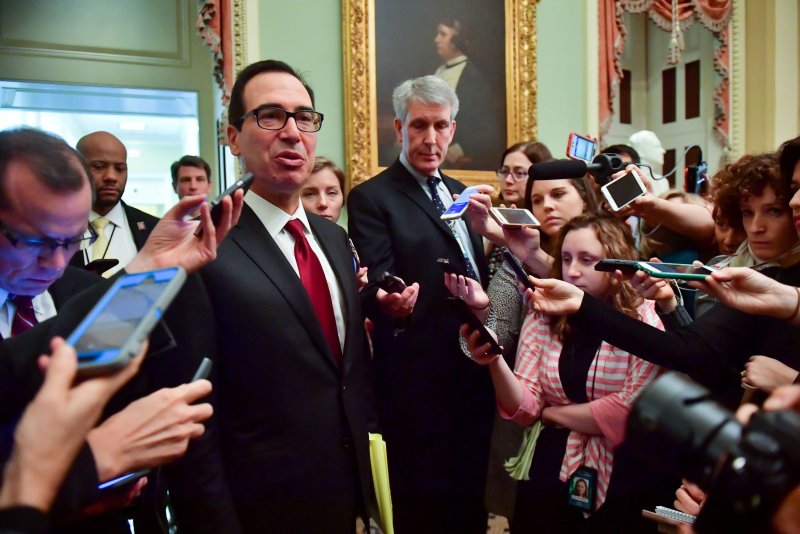Treasury Secretary Steve Mnuchin said he's enacted extraordinary accounting measures to avoid a default. File Photo by Kevin Dietsch/UPI |
License Photo
March 5 (UPI) -- Treasury Secretary Steven Mnuchin asked top lawmakers in Congress to raise the debt limit ceiling while his department enacts special accounting measures to avoid a default.
The debt ceiling -- preventing the United States from borrowing money internationally -- went back into effect this month after it was suspended for a full year.
In a letter sent Monday, Mnuchin said a debt issuance suspension period went into effect this week through June 5. Through the process, he said he's suspending investments in civil service retirement and federal employee funds to free up cash.
"I respectfully urge Congress to protect the full faith and credit of the United States by acting to increase the statutory debt limit as soon as possible," Mnuchin said in the letter addressed to House Speaker Nancy Pelosi, D-Calif., Senate Republican leader Mitch McConnell of Kentucky and six other congressional leaders.
President Donald Trump signed a law in February 2018 that temporarily eliminated the statutory limit on the debt ceiling -- or the maximum amount of debt the Treasury Department can issue to the public or federal agencies. That suspension expired at midnight Friday.
The national debt reached $22.01 trillion in January, exceeding $22 trillion for the first time in history.
Although the United States has maxed out its borrowing limit, experts say it will be months before it really begins to hurt. The Congressional Budget Office said last week the United States in the interim can rely on "a large inflow of tax revenues" in April as well as extraordinary measures to continue financing federal activities for a few months.
Those measures will only net enough money for a short period of time. The CBO analysis predicted the Treasury, without a raise in the debt ceiling, will run out of money by the end of September.
Pushing up the debt ceiling would require acts of Congress, but analysts say neither chamber is expected to act anytime soon because, with the months-long fiscal buffer, there's no sense of urgency. Backlogs caused by the 35-day federal shutdown earlier this year also makes it unlikely lawmakers will address the issue for a while, experts say.
Daniel Uria contributed to this report.















